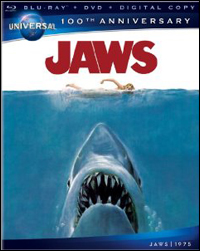
*
New technological formats — audio, visual or otherwise — allow purveyors of existing products to refine and repackage yesterday's up-to-the-minute edition into today's. This serves as an excuse to launch "new" product which has, in reality, been long available. While good movies remain good and bad remain bad — be it on VHS, Laserdisc or DVD — these new product launches can serve to bring acknowledged classics to new audiences. This month we get one of the finest foreign films of the 1930s — which can also be deemed one of the finest films of the '30s and one of the finest films ever. Joining our first selection is one of the biggest and most influential hits of the 1970s, which remains one of the best movies of its kind.
If the prospect of viewing a two-hour, black & white French-language prisoner-of-war movie leaves you less than enthusiastic, you may safely banish all qualms. Jean Renoir's La Grande Illusion [Lionsgate] offers grand, gripping entertainment from first to last. This is a wartime prison picture, yes; but it isn't really about war or prison. It is about humanity and society, and the breakdown of class. I fear that might not sound exciting, either. In Renoir's telling, though, it is. I was looking forward to this new Blu-ray, but wondered if the film would hold up to my memories of it (which were, vaguely, that the film was wonderful and not at about war or prison). Twenty minutes in, I was beaming in admiration of how simply perfect — and timeless — Renoir's film is.
The story opens with two French officers — the aristocratic Captain de Boeldieu (Pierre Fresnay) and the garage-mechanic-turned-Lieutenant Marechal (Jean Gabin) looking at some aerial photographs and flying off to inspect a suspicious-looking area. Shot down, they are ushered into the presence of their German captor, Captain von Rauffenstein (Erich von Stroheim). He immediately recognizes Count Boeldieu as a fellow gentleman; they have friends and colleagues in common, and even memories of the same courtesan at Maxim's. The film — which has no war scenes, incidentally — turns into philosophic discourse. De Boeldieu and Marechal are transferred to a prison camp, where they are joined by another Frenchman, Lieutenant Rosenthal (Marcel Dalio). Rosenthal's family, international bankers not unlike the Rothschilds, keep their scion stocked with food parcels filled with delicacies; Rosenthal, democratically, shares these with the French prisoners irrespective of class or religion.
 |
||
| Pierre Fresnay and Jean Gabin in "La Grande Illusion." |
||
| © Everett Collection |
And therein hangs a tale, detailed in a fascinating bonus feature on the new release. The world was left with worn prints of "La Grande Illusion" of varying quality. Renoir himself restored the film as best he could in 1958, and that is the version which circulated for the rest of the century. (Renoir — who by the way is the small child with bright orange hair in numerous paintings by his father, Pierre-Auguste Renoir — died in 1979.)
What nobody released was that when Germany surrendered, the Soviets seized the Reichsfilmarchiv holdings — including the original negative of "La Grande Illusion" — and sent them to Moscow. The negative eventually made its way to the Toulouse Cinematheque. There it sat for decades, the archivists assuming it was simply another old copy — it was common knowledge that the original negative had been burned by the Nazis — until someone thought to examine what was on the reels. This resulted in a superb restoration which made it to the Criterion Collection in 1999. (The film's prominence in the film world was such that its DVD spine number is Criterion #1.) Criterion's rights have expired; the Blu-ray comes from Lionsgate, as part of their StudioCanal Collection. The special features and booklet from the last release are gone, but there are some interesting new bonuses. The film is the thing, of course, and the Blu-ray of "La Grande Illusion" looks like it was shot yesterday.
Visit PlaybillStore.com to check out theatre-related DVDs for sale.
 |
||
| Cover art for "Jaws" |
It is of little moment — watching the 1975 film 35-odd years later — to recount the way it singlehandedly changed the feature film world, but "Jaws" instigated a thorough change. At the time, important movies opened at a handful of theatres in select cities; Radio City Music Hall, for example, was a prime spot. (The "Godfather" opened in just five theatres.) After a number of weeks, it would expand to additional cities, then to additional theatres in the same cities, and eventually widen until you could see it just about anywhere. An occasional film did open in numerous theatres, but these were usually titles that the studio was convinced would quickly die.
Realizing that they had a likely blockbuster on their hands, the producers and the studio wondered why they should make eager ticketbuyers in Boston, Philadelphia, Chicago, Washington, San Francisco (et al) wait months and months before "Jaws" got to Boston, Philadelphia (et al). Why not just open it everywhere, at once? Nobody had done it before, but Universal took the plunge and opened "Jaws" on 464 screens simultaneously. I remember front page coverage, not just about the movie but about the audacious marketing. (Instead of doing separate marketing campaigns spread over months of openings in different cities, "Jaws" was able to do one enormous initial push. Including an unheard-of national television campaign.) The results were jaw-dropping at the time; the Spielberg thriller became the first film to break the $100-million mark in rentals.
This instantly changed the way things were done, for better (in the case of blockbusters) or worse (in that flop movies flopped more loudly). The phenomenal business enjoyed by "Jaws," meanwhile, doesn't necessarily mean the movie is any good. But it is, as can be seen on the new Blu-ray edition. The 26-year-old Spielberg turned what could have been a mere adventure tale of three men on a shark hunt into a primal cinematic experience. We have seen many thrills and chills and surprises over the years, but there aren't many moments that compare with that moment. (If you don't know which scene I refer to, it's time to watch "Jaws.") This is on a level with the shower scene in Alfred Hitchcock's 1960 "Psycho" and the lesser-known but equally effective bathtub scene in Henri-Georges Clouzot's "Les Diaboliques." Each of which seem to scream out don't go in the water. Robert Shaw, Roy Scheider and Richard Dreyfuss make a compelling team, managing not to be overpowered by the big fish. Shark, that is. There is also a nifty score by John Williams, which instantly moved him into the top rung of film composers. The Blu-ray comes loaded with extras, including a new feature-length documentary about the film, "The Shark Is Still Working: The Impact & Legacy of 'Jaws.'" Other bonus features are retained from the "30th Anniversary Edition" of 2005.
*
 |
||
| Cover art for "Newsies" |
Over at the Marquis we have Michael Grandage's revival of Evita, which makes it an interesting time to watch the 1996 film version. Madonna, Antonio Banderas and Jonathan Pryce star. The Blu-ray, from Buena Vista, includes "The Making of 'Evita'" and Madonna's music video of "You Must Love Me."
Finally, Touchstone brings us a Blu-ray pairing of Sister Act (1992) and Sister Act 2: Back in the Habit (1993). Here are the original films, starring Whoopi Goldberg (along with Maggie Smith, among others). For those interested in screen-to-stage adaptations, a comparison of "Sister Act" (on film) and Sister Act: The Musical (at the Broadway, and soon to tour) should prove instructive.
(Steven Suskin is author of the recently released Updated and Expanded Fourth Edition of "Show Tunes" as well as "The Sound of Broadway Music: A Book of Orchestrators and Orchestrations," "Second Act Trouble" and the "Opening Night on Broadway" books. He also pens Playbill.com's Book Shelf and On the Record columns. He can be reached at [email protected].)
*
Visit PlaybillStore.com to check out theatre-related DVDs for sale.









Jeremy-Daniel.jpg)
